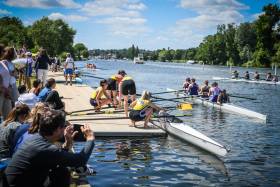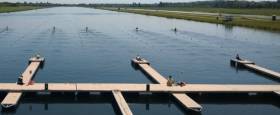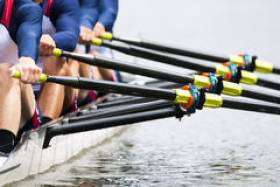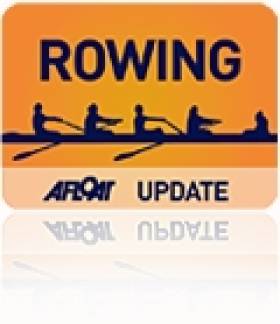Displaying items by tag: Tribesmen
#Rowing: Two NUIG crews made it through time trials on the first day of Henley Women’s Regatta and will compete on Saturday. In the Championship Eight, NUIG will take on Yale University (scheduled for 2.40), while the Development Coxed Four have been drawn to take on Aberdeen C at 2.04. Tribesmen were allowed only to compete in the time trial of the Championship Eight.
Three Irish crews made their exits: UCD’s eight, the four from Queen’s University and Cork’s Boat Club’s Championship Double. Commercial’s Championship Lightweight Pair have a bye into the semi-final and go into action first on Sunday (10.20).
Henley Women’s Regatta (Irish interest)
Friday
Championship Eight: NUIG made it through Time Trial.
Aspirational Academic Eight: Bath Univ/Bristol Univ bt UCD, 2 ½ l.
Aspirational Academic Four: Exeter Univ bt Queen’s A, nro
Development Coxed Four: NUIG made it through Time Trial.
Championship Doubles: Leander bt Cork A (C Deasy, J Rigothi) 4 ½ l.
#Rowing: Commercial finished second to Leander in the men’s Championship Eights at London Metropolitan Regattta at Dorney Lake today. It was one of a string of good results for Irish clubs. NUIG and Tribesmen shone and teamed up to win the women’s Championship coxed four. UCC – who took second in the Championship single sculls through Ronan Byrne – also excelled. Trinity, the University of Limerick, Shandon and Castleconnell also had wins.
London Metropolitan Regatta, Dorney Lake (Irish interest; selected results, winners unless stated)
Men
Eight – Championship: 1 Leander 5:49.90, 2 Commercial 5:52.74.
Four – Championship: 3 Commercial 6:12.20. Tier Two: Shandon.
Four, coxed – Tier Three: Tribesmen 6:32.26. Academic, Tier Two: NUIG.
Pair – Tier Two: UCC 7:14.93.
Double Sculls – Championship: 2 UCC (R Byrne, H Sutton) 6:32.50. Tier Two: Castleconnell 6:42.50.
Single Sculls – Championship: 2 UCC (R Byrne) 7:03.99. Tier Two: Univ of Limerick (K Mannix) 7:18.36. Tier Three: St Michael’s (D O’Connor).
Women
Eight – Club, Tier Two: NUIG/Tribesmen 6:50.64. Academic, Tier Two: Trinity 6:57.77.
Four – Academic, Tier Two: Trinity 7:08.62.
Four, coxed – Championship: NUIG/Tribesmen 7:20.88. Tier Four: Univ of Limerick.
Pair – Championship: 2 Commercial (H O’Neill, R Morris) 7:46.57. Tier Two: NUIG 7:39.84.
Double Sculls – Championship: 3 London/Skibbereen (M Jackson, N Long) 7:28.48.
Tribesmen Off and St Michael's Moves Because of Weather
#Rowing: The Tribesmen Head of the River, set for Lough Rynn on Saturday (February 10th) has had to be called off because of a forecast of rain and gale force gusts of wind. The organisers hope to hold a deferred event in March.
The weather has caused a change in venue for another event. Flooding at O’Brien’s Bridge has forced the organisers of the St Michael’s Head of the River on February 24th to move it to the St Michael’s club on O’Callaghan’s Strand in Limerick.
Skibbereen and Tribesmen Best of Irish Lightweights
#Rowing: Justin Ryan and Siobhan McCrohan took the lightweight single sculls titles at the Irish Rowing Championships today. The Skibbereen man and Tribesmen woman were commanding winners. McCrohan had already won the senior singles title, while Ryan was taking his second consecutive lightweight title at the National Rowing Centre. Last year he represented UCC.
Two crews won by taking early command of their races. Colm Hennessy and Ronan Byrne in the Shandon junior double and the Commercial intermediate pair of Colm Dowling and Neil Gahan gauged the tailwind well and used it to back up their good starts.
NUIG also won the women’s intermediate coxed four well, and Bann’s Hannah Scott and Katie Shirlow, added the junior pair to their junior fours crown.
Queen’s took the club coxed four, having already won the club eight. They held off UCD’s challenge in the closing stages.
Irish Rowing Championships, National Rowing Centre, Cork, Day Three (Selected results)
Men
Four – Club, coxed: 1 Queen’s 6:28.23, 2 UCD A 6:30.77, 3 NUIG A 6:36.48.
Pair – Intermediate: 1 Commercial A 6:47.94, 2 Skibbereen 6:55.20, 3 Portora 7:00.19.
Sculling, Double – Junior: 1 Shandon 6:40.27, 2 Castleconnell A 6:50.48, 3 Cork BC B 6:55.56.
Lightweight Single: 1 Skibbereen (J Ryan) 7:09.17, 2 Skibbereen (McCarthy) 7:12.63, 3 St Michael’s (D O’Connor) 7:15.40.
Women
Four – Intermediate, coxed: 1 NUIG 7:09.66, 2 Commercial 7:18.28, 3 Shannon 7:23.16.
Pair – Junior: 1 Bann 7:42.60, 2 Portora 7:47.30, 3 Lee 7:51.35.
Sculling, Single – Lightweight: 1 Tribesmen (S McCrohan) 7:46.48, 2 Commercial (Sarah Dolan) 7:50.22, 3 Skibbereen (O Hayes) 8:00.39.
































































